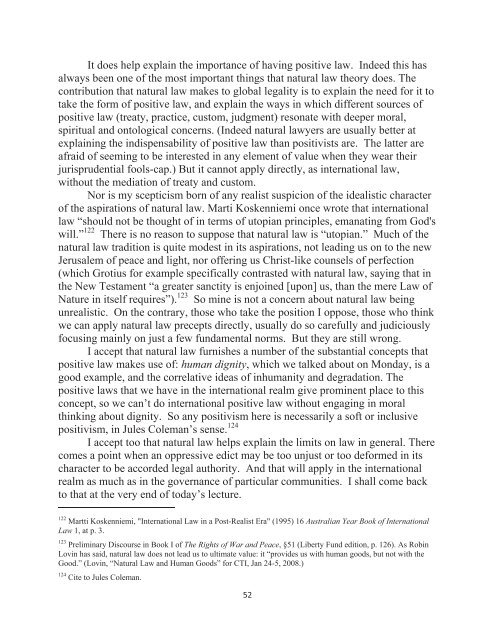International Legal Evangelism: Intelligence, Reconnaissance & Missions
International Legal Evangelism: Intelligence, Reconnaissance & Missions
International Legal Evangelism: Intelligence, Reconnaissance & Missions
You also want an ePaper? Increase the reach of your titles
YUMPU automatically turns print PDFs into web optimized ePapers that Google loves.
It does help explain the importance of having positive law. Indeed this has<br />
always been one of the most important things that natural law theory does. The<br />
contribution that natural law makes to global legality is to explain the need for it to<br />
take the form of positive law, and explain the ways in which different sources of<br />
positive law (treaty, practice, custom, judgment) resonate with deeper moral,<br />
spiritual and ontological concerns. (Indeed natural lawyers are usually better at<br />
explaining the indispensability of positive law than positivists are. The latter are<br />
afraid of seeming to be interested in any element of value when they wear their<br />
jurisprudential fools-cap.) But it cannot apply directly, as international law,<br />
without the mediation of treaty and custom.<br />
Nor is my scepticism born of any realist suspicion of the idealistic character<br />
of the aspirations of natural law. Marti Koskenniemi once wrote that international<br />
law “should not be thought of in terms of utopian principles, emanating from God's<br />
will.” 122 There is no reason to suppose that natural law is “utopian.” Much of the<br />
natural law tradition is quite modest in its aspirations, not leading us on to the new<br />
Jerusalem of peace and light, nor offering us Christ-like counsels of perfection<br />
(which Grotius for example specifically contrasted with natural law, saying that in<br />
the New Testament “a greater sanctity is enjoined [upon] us, than the mere Law of<br />
Nature in itself requires”). 123 So mine is not a concern about natural law being<br />
unrealistic. On the contrary, those who take the position I oppose, those who think<br />
we can apply natural law precepts directly, usually do so carefully and judiciously<br />
focusing mainly on just a few fundamental norms. But they are still wrong.<br />
I accept that natural law furnishes a number of the substantial concepts that<br />
positive law makes use of: human dignity, which we talked about on Monday, is a<br />
good example, and the correlative ideas of inhumanity and degradation. The<br />
positive laws that we have in the international realm give prominent place to this<br />
concept, so we can’t do international positive law without engaging in moral<br />
thinking about dignity. So any positivism here is necessarily a soft or inclusive<br />
positivism, in Jules Coleman’s sense. 124<br />
I accept too that natural law helps explain the limits on law in general. There<br />
comes a point when an oppressive edict may be too unjust or too deformed in its<br />
character to be accorded legal authority. And that will apply in the international<br />
realm as much as in the governance of particular communities. I shall come back<br />
to that at the very end of today’s lecture.<br />
<br />
122 Martti Koskenniemi, "<strong>International</strong> Law in a Post-Realist Era" (1995) 16 Australian Year Book of <strong>International</strong><br />
Law 1, at p. 3.<br />
123 Preliminary Discourse in Book I of The Rights of War and Peace, §51 (Liberty Fund edition, p. 126). As Robin<br />
Lovin has said, natural law does not lead us to ultimate value: it “provides us with human goods, but not with the<br />
Good.” (Lovin, “Natural Law and Human Goods” for CTI, Jan 24-5, 2008.)<br />
124 Cite to Jules Coleman.<br />
<br />
52

















